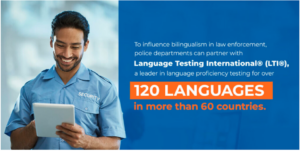
Bilingual police officers are a critical asset to your law enforcement agency, particularly in communities where residents are less proficient in English. Police officers who understand the cultures of these residents and can effectively communicate with them allow non-English language users to feel safe and understood. They also enable law enforcement professionals to receive more accurate information about crimes.
バイリンガルの警察官は、特に住民の言語運用能力が低い地域社会では、法執行機関にとって重要な資産です。このような住民の文化を理解し、彼らと効果的にコミュニケーションができる警察官は、英語を母国語としない人々に安心感と理解を与えます。また、法執行の専門家が犯罪についてより正確な情報を得ることも可能になります。
This guide explores the demand for bilingualism in law enforcement in more detail and offers practical strategies for building rapport within the community.
このガイドでは、法執行機関におけるバイリンガルの需要について詳しく説明し、地域社会で信頼関係を築くための実践的な戦略を提供します。
Understanding the Demand for Bilingualism in Law Enforcement(法執行機関におけるバイリンガリズムの需要を理解する)
The multilingual makeup of U.S. society is growing, increasing the need for law enforcement employees with world language proficiencies. Whether their interactions with citizens are friendly or to remind them of the law, effective communication and understanding can help officers connect with community members on a deeper level.
米国社会の多言語化が進み、世界言語に堪能な警察官の必要性が高まっています。市民との交流が友好的なものであれ、法律を思い出させるためのものであれ、効果的なコミュニケーションと理解があれば、警察官は地域住民と深いレベルでつながることができます。
Communication barriers can create distrust and misunderstanding in the community and may even breed xenophobia. Bilingualism in law enforcement helps ensure that non-English-speaking communities feel safer and more confident in their police force and can comprehend situations as they happen.
コミュニケーションの障壁は、地域社会に不信と誤解を生み、外国人嫌いを生む可能性さえあります。法執行機関におけるバイリンガリズムは、非英語圏の地域社会が警察をより安全で信頼できると感じ、状況を理解できるようにするのに役立ちます。
Fortunately, the Office of Community Oriented Policing Services (COPS Office) developed a policy that ensures people with limited English proficiency, also called limited English proficient (LEP) people, have access to the assistance they need when they encounter a federally conducted program or activity.
幸いなことに、地域指向警察サービス局(COPS事務局)は、英語が不自由な人々(LEP(Limited English Proficient)とも呼ばれる)が、連邦政府が実施するプログラムや活動に遭遇した際に、必要な支援を受けられるようにする方針を策定しました。
A federally conducted program or activity involves law enforcement professionals engaging with the general public as part of an ongoing federal agency operation. It may also include a program or activity where LEP individuals are beneficiaries or participants in a federal agency’s direct service or benefit administration.
連邦政府が実施するプログラムまたは活動には、進行中の連邦政府機関の活動の一環として、法執行の専門家が一般市民と関わることが含まれます。また、LEP個人が連邦機関の直接サービスまたは給付管理の受益者または参加者であるプログラムまたは活動も含まれます。
An agency is typically obligated to provide language-assisted services if a case meets the requirements in the four-factor analysis set by the COPS Office. This analysis depends on the number of LEP people an eligible law enforcement service encounters in an area, how frequently LEP individuals get involved with federally conducted programs, how beneficial or important the service or program is, and the resources available and their cost implications for the agency.
ある案件がCOPS事務局によって定められた4要素分析の要件を満たす場合、通常、機関は言語支援サービスを提供する義務を負うことになります。この分析は、対象となる法執行サービスが地域で遭遇するLEP人の数、LEP人が連邦政府が実施するプログラムに関わる頻度、サービスまたはプログラムがどれほど有益または重要であるか、利用可能な資源とその機関が負担する費用によって決まります。

To influence bilingualism in law enforcement, police departments can partner with Language Testing International® (LTI), a leader in language proficiency testing for over 120 languages in more than 60 countries. Whether you’re looking to test candidates’ language skills or train and test current employees, LTI delivers ACTFL assessments to determine whether they have the language proficiency required to bridge the communication gap between different cultural identities.
法執行機関におけるバイリンガリズムに影響を与えるために、警察署は、60カ国以上、120言語以上の言語運用能力試験のリーダーです。Language Testing International®(LTI)と提携することができます。LTIは、求職者の言語スキルをテストする場合でも、現在の従業員を訓練してテストする場合でも、異なる文化的アイデンティティの間のコミュニケーションギャップを埋めるために必要な言語能力があるかどうかを判断するACTFL評価を提供します。
The Importance of Communication Skills for Bilingual Officers(バイリンガル役員におけるコミュニケーション能力の重要性)
Some policing situations require immediate action, such as responding to emergencies and de-escalating potentially dangerous situations. Having bilingual officers can help ensure they quickly evaluate and understand the circumstances. They can also easily ask questions, understand community members, and communicate legal rights and responsibilities. These tasks require advanced communication skills, allowing officers to perform their daily duties in other languages.
取り締まりの状況によっては、緊急事態への対応や潜在的に危険な状況の緩和など、即座の行動が求められることがあります。バイリンガルの警察官がいれば、状況を迅速に判断し、理解することができます。また、質問しやすく、地域住民を理解しやすく、法的権利と責任を伝えやすくなります。これらの業務には高度なコミュニケーション・スキルが必要であるため、警官は日常業務を他の言語で行うことができます。
Effective policing also involves educating the community while building trusting relationships. Officers should address participants at an incident in a way that reduces tension. Proficiency in other languages can help law enforcement collaborate with the community when investigating criminal activity and take accurate testimony while speaking with witnesses, victims, or their relatives. Departments may want to enroll employees in tailored police officer training programs, which can teach officers cultural sensitivity and the language skills needed to work with diverse communities.
効果的な取り締まりには、信頼関係を築きながら地域社会を教育することも含まれます。警察官は、緊張を和らげるような方法で、事件の参加者に対応すべきで。言語運用能力は、警察当局が犯罪行為を捜査する際に地域社会と協力し、目撃者や被害者、その親族と話す際に正確な証言を取るのに役立ちます。各警察署は、多様な地域社会と協力するために個別の警察官研修プログラムに職員を参加させたり、必要な文化的感受性や言語能力を警察官に教えることができます。
Implementing Community Policing Strategies in Multilingual Communities(多言語コミュニティにおけるコミュニティ警察戦略の実施)
According to a study about diversity in policing published by Science in 2021, Hispanic and Black police officers and female officers in Chicago use less force and make fewer stops and arrests than white male officers do. Encouraging positive interactions and experiences for the community in this way requires a deeper understanding of particular locations.
2021年のサイエンス誌に掲載された警察活動の多様性に関する研究によると、シカゴのヒスパニック系と黒人の警察官と女性警察官は、白人の男性警察官よりも武力行使が少なく、停留や逮捕の回数も少ないといいます。このように地域社会にとって好ましい交流や経験を促すには、特定の場所に対する理解を深める必要があります。
One effective community policing strategy includes collecting data about the demographics of communities, residents’ characteristics, and prominent languages in the area. After gaining this information, departments can recruit and deploy bilingual staff and allocate resources accordingly.
効果的な地域警察戦略のひとつに、地域社会の人口統計、住民の特徴、その地域の主要言語に関するデータの収集があります。こうした情報を得た上で、警察署はバイリンガルの職員を採用、配置し、それに応じて資源を配分することができます。
Law enforcement agencies can also establish language access protocols and policies for interacting with LEP people. Departments can also coordinate with one another to share resources and create improved communication approaches for LEP residents.
法執行機関はまた、LEPの人々と対話するための言語アクセス・プロトコルと方針を確立することができます。各部署はまた、リソースを共有し、LEP住民のための改善されたコミュニケーションアプローチを作成するために相互に調整することができます。
Benefits and Challenges of Bilingual Policing(バイリンガル・ポリシングの利点と課題)
Bilingual police officers help foster more inclusive environments by building trust and rapport within the community. When residents feel they can trust their local police, they may be more likely to come forward about crimes in the area and more willing to share information that may be critical to investigations. Having bilingual units with officers who speak their language and understand their culture helps build trust. Bilingual policing also creates increased job satisfaction and retention rates because the work environment allows all officers to feel welcomed and appreciated.
バイリンガルの警察官は、地域社会で信頼関係を築くことで、より包括的な環境を醸成するのに役立ちます。住民が地元警察を信頼できると感じれば、その地域の犯罪について名乗り出やすくなり、捜査に不可欠な情報を進んで共有するようになるかもしれません。地元の言語を話し、地元文化を理解する警察官と二ヶ国語を話す警察官を配備することは、信頼関係の構築に役立ちます。また、バイリンガル・ポリシングは、すべての警官が歓迎され、評価されていると感じられる職場環境であるため、仕事に対する満足度や定着率の向上にもつながります。
One of the challenges is that there may be a limited number of qualified bilingual candidates. In some multilingual cities, some residents may be non-English language users or know their native language more than English. Others may be fluent in English and only know the basics of another world language, decreasing their likelihood of communicating effectively during high-stress situations.
課題の一つは、適格なバイリンガル候補者の数が限られていることです。多言語都市では、住民の中には英語を話さない人や、英語よりも母国語を知っている人もいます。また、英語が堪能でも、他の世界言語の基本的なことしか知らない人もおり、ストレスの多い状況下で効果的なコミュニケーションが取れる可能性が低くなります。
The Path Forward: Training and Testing for Bilingual Law Enforcement Professionals(前進への道:バイリンガルの法執行専門家のための訓練と試験)
Despite the challenge of finding well-suited bilingual candidates, current law enforcement professionals and new recruits can undergo training and testing to enhance or evaluate their language capabilities.
適切なバイリンガルの候補者を見つけるのは難しいことですが、現職の法執行専門家や新入社員は、言語能力を強化したり評価したりするための訓練や試験を受けることができます。
Start by creating and implementing language training programs. Use these educational programs to teach law enforcement professionals cultural communication skills, essential terms, and best practices to remember. You can also encourage these individuals to practice independently to improve how they deliver commands and have necessary conversations with community members.
言語研修プログラムを作成し、実施することから始めましょう。このような教育プログラムを利用して、法執行機関の専門家に文化的なコミュニケーションスキル、重要な用語、覚えておくべきベストプラクティスなどを教えてください。また、地域住民との命令や必要な会話の方法を向上させるために、これらの人々に自主的に練習するよう奨励することもできます。
Remember that employees have varying language skills. Testing current employees and potential candidates with language proficiency assessments measures an individual’s ability to use a particular language regardless of how they acquired it.
従業員の言語能力はさまざまであることを忘れてはなりません。現在の従業員や潜在的な候補者に言語運用能力をテストすることで、その言語をどのように習得したかにかかわらず、特定の言語を使用する能力を測定することができます。
As the exclusive licensee of ACTFL assessments, LTI delivers proficiency tests in speaking, listening, writing, and reading. The ACTFL scale rates proficiency in four main levels — Novice, Intermediate, Advanced, and Superior. Each main level is further divided into Low, Mid, and High sublevels to help determine whether a person has the proficiency required for effective communication.
ACTFL評価の独占ライセンシーとして、LTIはスピーキング、リスニング、ライティング、リーディングの能力テストを提供しています。ACTFLの評価基準は、初級、中級、上級、最上級の4つのレベルに分かれています。各レベルはさらにLow、Mid、Highのサブレベルに分かれており、効果的なコミュニケーションに必要な能力を備えているかどうかを判断するのに役立ちます。
Get Language Proficiency Testing for Law Enforcement Employees With LTI(LTIで法執行機関従業員のための言語運用能力試験を受ける)

Bilingual law enforcement employees can help community residents feel safe and secure while relying on police officers. A bilingual program can also retain diverse employees. LTI has delivered language assessments to government and federal agencies since 1998 to measure candidate and employee language proficiency, making it a reliable and effective way to assess your employees’ abilities.
バイリンガルの法執行職員は、地域住民が警察官を頼りにしながらも、安全で安心だと感じることができます。また、バイリンガル・プログラムは、多様な従業員を確保することができます。LTIは1998年以来、政府機関および連邦政府機関に候補者および従業員の言語運用能力を測定するための言語アセスメントを提供しており、従業員の能力を評価するための信頼できる効果的な方法となっています。
Our professionals will speak with you to identify your unique needs and deliver language assessments that accurately reflect those needs. To start building bilingualism in law enforcement, request a quote with iGroup Japan today.
LTIの専門家が、お客様独自のニーズを特定し、そのニーズを正確に反映した言語評価を提供します。法執行機関におけるバイリンガルの育成を開始するには、弊社までお問い合わせください。




